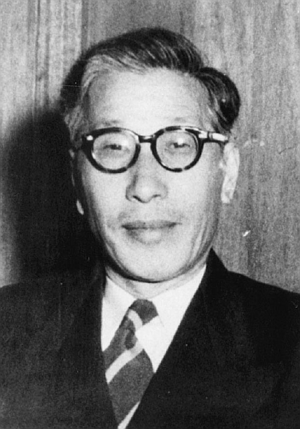Ho Chong facts for kids
Quick facts for kids
Ho Chong
|
|
|---|---|
|
허정
許政 |
|

Ho in the early 1950s, during his tenure as the mayor of Seoul.
|
|
| 6th Prime Minister of South Korea | |
| In office June 15, 1960 – August 18, 1960 |
|
| Preceded by | Ho Chong (Ministries involved) |
| Succeeded by | Chang Myon |
| 8th Mayor of Seoul | |
| In office 14 December 1957 – 11 June 1959 |
|
| Preceded by | Goh Chaebong |
| Succeeded by | Kim Heung Soon |
| Personal details | |
| Born | April 8, 1896 Pusan, Gyeongsang-do, Joseon Dynasty (now Busan Metropolitan City, South Korea) |
| Died | September 18, 1988 (aged 92) Seoul, South Korea |
| Political party | Democratic Party |
| Spouse | Baek Gui-Ran |
| Korean name | |
| Hangul | |
| Hanja | |
| Revised Romanization | Heo Jeong |
| McCune–Reischauer | Hŏ Chŏng |
| Art name | |
| Hangul | |
| Hanja | |
| Revised Romanization | Uyang |
| McCune–Reischauer | Uyang |
Ho Chong, also known as Huh Chung or Heo Jeong (Korean: 허정; Hanja: 許政; April 8, 1896 – September 18, 1988), was an important South Korean politician. He was also an activist who worked for Korean independence. He served as the sixth Prime Minister of South Korea during a period called the Second Republic.
In 1960, he was an acting prime minister during the First South Korean Republic. He also led a temporary government for a short time. This happened after the 1960 April Revolution, which changed the government. Ho Chong was also known by his nickname, "Uyang" (우양; 友洋), which means "friend of the seas."
Contents
Ho Chong's Early Life and Activism
Ho Chong was born in Busan, a city in South Gyeongsang province. His father, Ho Mun-il, was a successful merchant. In 1922, Ho Chong went into political asylum, which means he sought safety in another country because of his political beliefs. There, he helped Syngman Rhee, who would later become the first president of South Korea.
From 1922 to 1936, Ho Chong was involved in movements to resist foreign rule in Korea. These movements aimed for Korea's independence.
Ho Chong's Political Career
After Korea gained independence, Ho Chong continued his political work. On September 2, 1945, he joined the Korea Democratic Party. This was a key political group at the time.
In 1950, he was appointed as the Acting Prime Minister. Later, in 1951, he also became the Minister of Health. He held this health position until 1952.
Mayor of Seoul and Special Envoy
From 1957 to 1959, Ho Chong served as the Mayor of Seoul, the capital city. After that, he was sent to Japan as a special representative from South Korea. This role helped improve relations between the two countries.
Leading During a Revolution
On April 16, 1960, Ho Chong became the Foreign Minister. Just a few days later, on April 25, he was appointed Acting Prime Minister. The very next day, President Syngman Rhee resigned from his position.
Ho Chong then became the Acting President until August 18 of that year. This was a very important time for South Korea, as the government was changing after the April Revolution. On July 16, 1960, the National Assembly officially appointed him as the 6th Prime Minister of South Korea. He continued to serve as Acting President until Yun Bo-seon was elected.
His Relationship with Syngman Rhee
Ho Chong first met Syngman Rhee in 1919 at a church in Seoul. From that time until 1960, Ho Chong was a strong supporter of Syngman Rhee.
See also
 In Spanish: Heo Jeong para niños
In Spanish: Heo Jeong para niños
- April 19 Movement
- Politics of South Korea
- History of South Korea
- Syngman Rhee
External Links
- Heo Jeong
 | Audre Lorde |
 | John Berry Meachum |
 | Ferdinand Lee Barnett |

